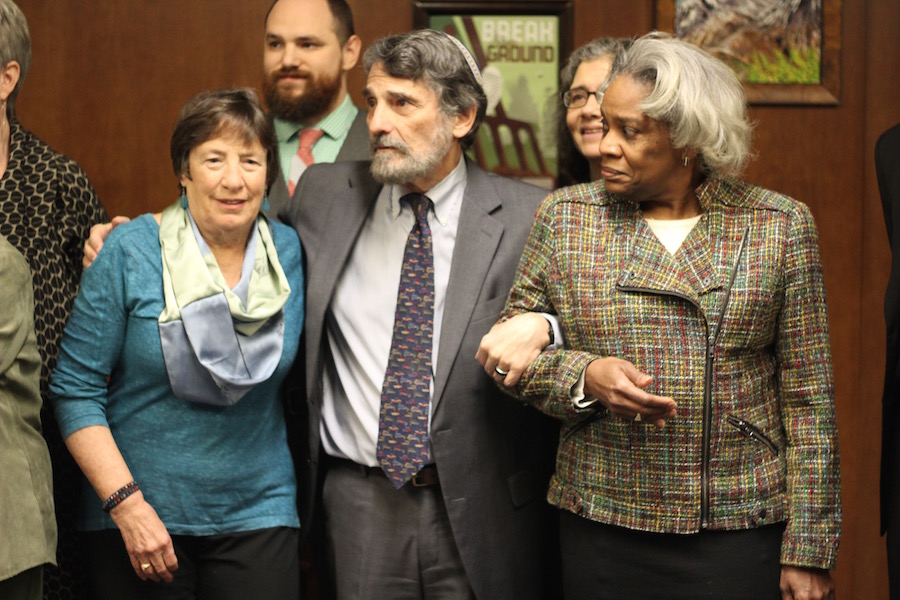
Congregation Mishkan Israel | Hamden | News From The Pews
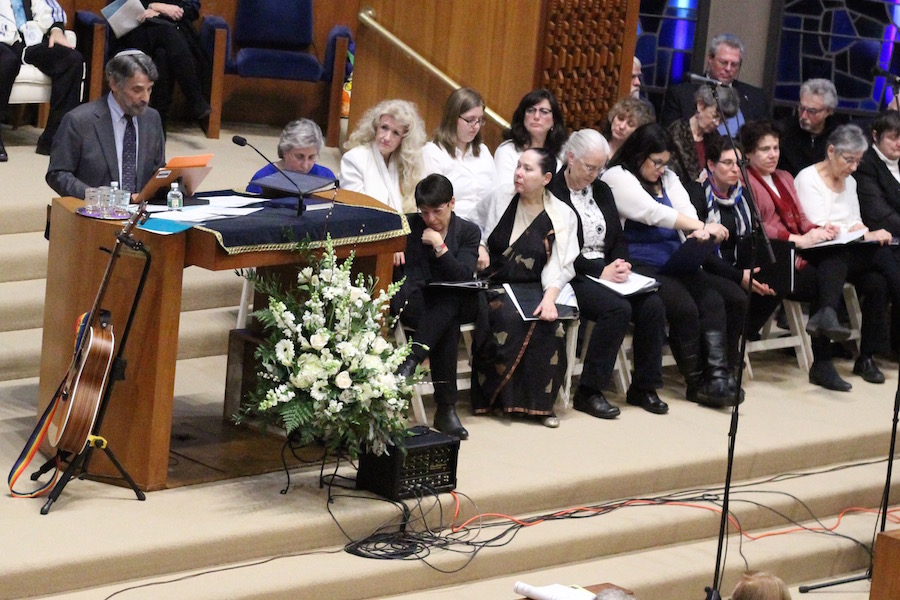
| Rabbi Herbert Brockman:“Are we a transactional people, or will we be a transformational people?” Lucy Gellman Photos. |
Two kings stood at a crossroads. One raised his hands to the sky and warned that white men were on the brink of losing power, that foreigners were invading his holy land. The other preached a sermon of civil rights, where violence was never the answer and all human beings stood on equal footing. History was left to decide who would be remembered.
One was white supremacy apologist and Iowa Congressman Steve King. One was civil rights icon Martin Luther King, Jr.
Rabbi Herbert Brockman drew that distinction Friday night during his keynote address at Congregation Mishkan Israel’s annual Martin Luther King, Jr. Day interfaith service. Over 15 different congregations were represented in the Hamden synagogue, including the Muhammad Islamic Center of Greater Hartford, Archdiocese of Hartford, Justice for Our Neighbors in New York, Yale University’s religious organizations, Temple Emanuel, Baha’i of Greater New Haven, Christian Community Action and several others.
“We find ourselves in this twenty-first century in a most troubling time,” he said. “While civil rights, poverty, hunger and the other ills of the twentieth century are still with us, today a plethora of political, economic and social challenges still abide. And I would like to suggest, tonight, that these are all skirmishes … battles in a greater war, a war that has been heightened by recent events.”

Brockman, who retired as the synagogue’s leader last June, returned to his former beemah to present the congregation with two King-led paths that Americans can choose between in 2019: one the path of white supremacy and racialized violence, the other the path of equal rights and racial justice. While Mishkan has celebrated MLK’s birthday with a commemorative service every year since the civil rights leader was assassinated in 1968, Friday marked the congregation’s seventh annual interfaith event.
Before the service, CMI Rabbi Brian Immerman gathered the group in his office for communal prayer, faith leaders bowing their heads as an assortment of prayer shawls, bright yarmulkes, blazers and robes dotted the space. He asked for a creator who could bring light to a great darkness, giving him and others in the room the strength to lead.
“Source of life, we are grateful for this moment to bring so many of us together from different faiths here to honor the legacy of Martin Luther King, Jr.” he prayed. “To carry on his legacy in our own communities. We pray that you continue to give us the strength and courage to speak truth to power.”
The service itself featured a dozen different faith leaders citing relevant texts from their own traditions, praising love, diversity, and connection as necessary balms to a world filled with hate, misunderstanding, and isolation. Turning to Corinthians, Whitney Center Chaplain Rev. Maria LaSala prayed for freedom through worship and action, setting a tone for the evening.
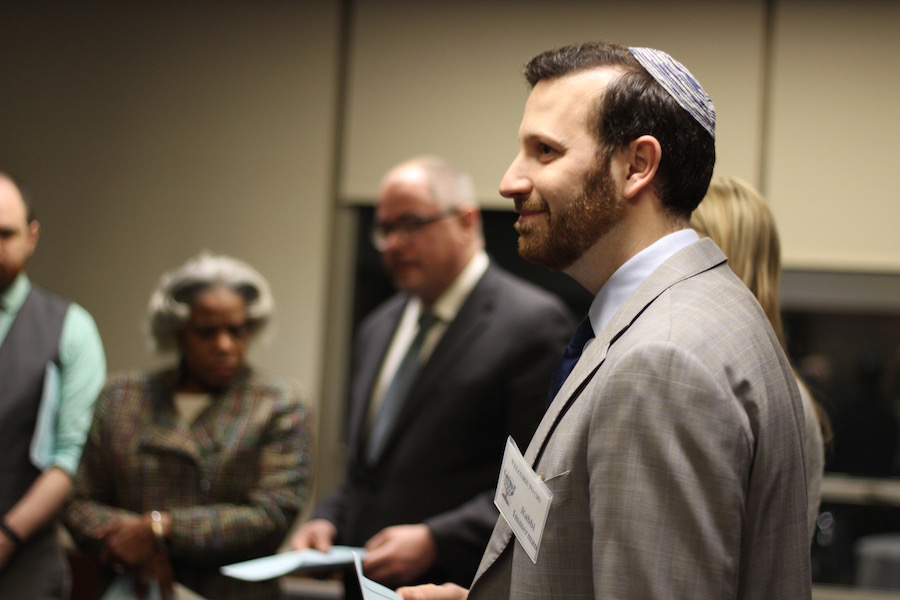
| Current CMI Rabbi Brian Immerman: Truth to power. |
But when Brockman took the beemah for his keynote address, he put aside anodyne references to millennia-old scripture and directly addressed the contemporary resonances of MLK’s life, juxtaposing it with the fear and bigotry represented by a different American King. These two Kings, he said, represent competing visions for America in 2019.
Brockman began with the first—Iowa Rep. Steve King, a Republican congressman who has maintained that America was “founded by, built by and for white Europeans.” After rising to national prominence as Donald Trump’s campaign manager in Iowa, King has positioned the United States as in a war against time, as white Americans lose their power to foreigners and people of color. He has warned that if immigrants and refugees continue to come into the United States, “they will mongrelize our way of life,” threatening a system of white hetero-patriarchy that has always relied on the subjugation of women and people of color to exist.
That’s language from an earlier campaign, Brockman cautioned attendees—Warren G. Harding’s 1921 “America First” agenda, which spurred a rise in Ku Klux Klan activity, public lynchings, and immigration quota laws that restricted both the number of immigrants and countries from they could come for the first time in U.S. history. It was a period marked by bribery, scandal and corruption.
“Today Harding is but a footnote in history,” he said. “This is a transactional view of America.”
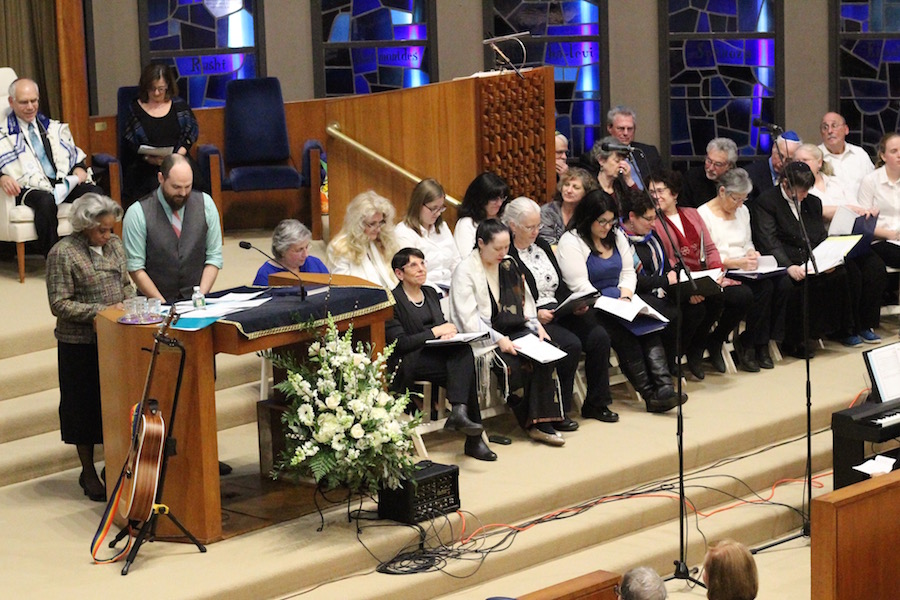
| Revs. Bonita Grubbs and Jack Davidson. After the service, Grubbs said the promise of Brockman's sermon is what brought her out to the event. |
But then there is another King, Brockman said—the Rev. Dr. Martin Luther King, Jr., who addressed the Hamden congregation when the synagogue was formally dedicated in October 1961. The King who, amidst near-constant threats on his life, marched for Civil Rights, spoke out passionately against the Vietnam War, and advocated for nonviolence even as whites carried out systemic, repeated physical brutality on bodies of color.
The King who was killed in the midst of practicing what he preached, speaking out for striking sanitation workers in Memphis, Tenn. the night before he was assassinated. The King that “understood that at the heart of his message was that justice for one must be justice for all.”
“Are we a transactional people, or will we be a transformational people?” Brockman asked, looking up at a full congregation as he spoke. “We may pass laws about public accommodation rights, about voting rights, about the proper role of government with respect to people in poverty, the sick, indigent ... but I suggest this evening that at the heart of all of these is the question about who we are as a nation.
"This, to my mind, is what MLK would see as the real crisis of our time.”
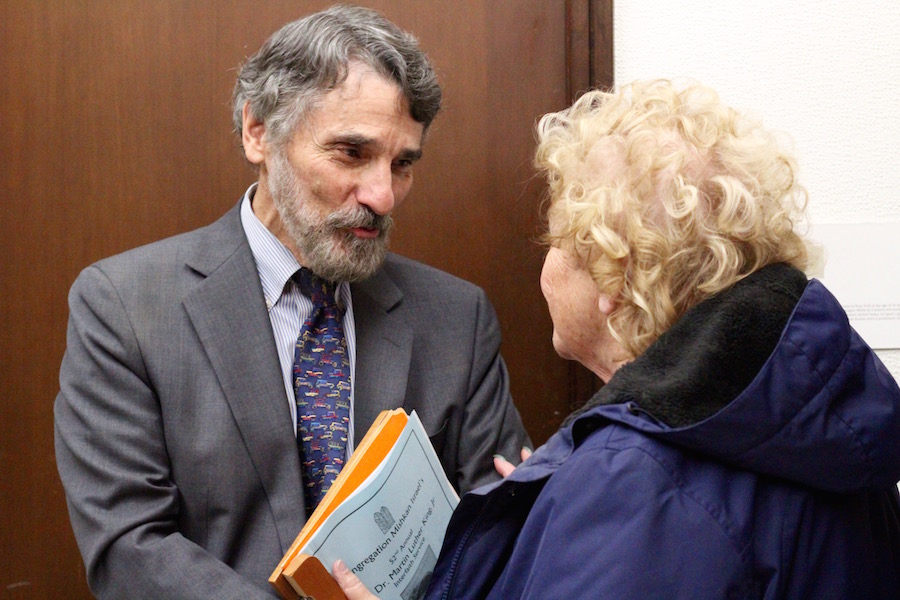
If Americans fall in line with the latter King, he said, they must speak out for immigrants and refugees “as the defining civil rights issue of our time.” Not only in opposing the border wall that was once Trump’s campaign promise, and now stands at the center of the government shutdown, but also in joining organizations such as JCARR and supporting sanctuary congregation movements and sanctuary cities.
He recalled watching one such chain of support, as a young mother and her child arrived from Congo two years ago. Somehow, the two had ended up not in New Haven, but in the Midwest, where officials put them on a bus bound for Port Authority. But when the bus arrived in New York, “they were not on it.”
So a chain of action was activated: officials found then in Philadelphia, escorted them to New Jersey, got them to Port Authority. A stranger, hearing of the ordeal that they had been through, offered to see them to New Haven. When they arrived safely, all he asked in return for the effort was a cold beer before he headed back home.
And another, as a Syrian family landed at John F. Kennedy just hours after Trump issued his first immigration ban in January 2017. As the family headed through the airport, a Customs and Border Patrol official looked at their papers, looked at them, looked back at their papers, and then rushed them through the line.
“Quickly, quickly, he said,” Brockman recalled. “They’ve not issued us our orders yet.”
“This is the real America,” he said, adding that he worries about the children of Nury Chavarria, of Nelson Pinos, of his Nigerian friend who have received deportation orders in the past three years. “When we welcome refugees and immigrants, we expand this country. Here we tear down barriers, not build walls.”
His message rang true throughout the evening, carried through musical selections that included “Precious Lord,” and “We Shall Overcome,” sung with the traditional Hebrew “Mi Chamocha,” thanking God for delivering Jews out of Egypt during the story of the Exodus. Across traditions, faith leaders zeroed in on prayers that espoused the same message: inclusion over exclusion; love for one’s neighbor as love for one’s own self and family.
Closing the service with a final benediction, Bishop Peter Rosazza returned to the Martin Luther King, praising his legacy of nonviolence as “the only choice that would lead to peace.”
“He suffered personally in attacks from people who couldn’t bear to hear the truth,” he said. He prayed for King’s legacy, writings, and prayer to “let their power flow in the hearts of all who live in our great country, so that the sin of racism may be expunged from our hearts.”
“You are our father,” he said. “You have no second-class children.”
To listen to Rabbi Herbert Brockman’s full remarks, click on or download the audio below.

